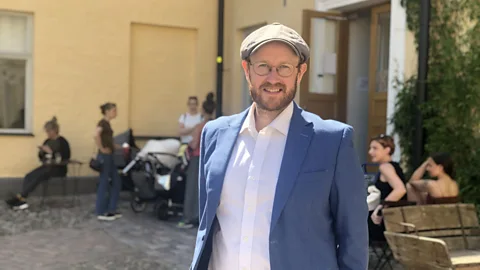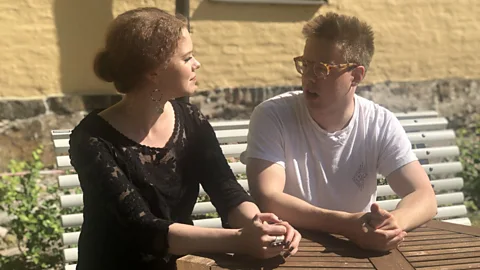Being depressed in the 'world's happiest country'
 Maddy Savage
Maddy SavageFinland regularly tops global rankings as the happiest nation on the planet, but this brings a unique set of challenges for young people struggling with depression.
Basking in the sunshine outside a coffee shop decked out with minimalist Nordic furniture and colourful textiles, Tuukka Saarni is something of a poster boy for Finland’s position atop the UN’s happiness rankings, for the second year in a row.
“I’m pretty happy right now,” says the 19-year-old, who recently finished high school and is about to start a job in a grocery store after a few months searching for work.
In fact, he rates his happiness levels as 10 out of 10, saying neither he nor anyone in his friendship group has experienced depression.
“Our lives are going really well,” he says. “It’s a great mixture of things. We have good weather – sometimes at least – good education and good healthcare.”
A national culture that supports spending time alone as well as with friends is also something he values, alongside Finland’s ample nature and low unemployment levels. “There’s a lot of jobs...if one is ready to apply and search for a job, then I think everyone can get a job,” he argues.
It is these kind of markers – alongside high levels of trust and security and low rates of inequality – that explain Finland’s sometimes controversial top position in global happiness rankings.
The small, northerly nation, with a population of just 5.5 million people, has historically been stereotyped as having a melancholic mentality linked to its long, dark winters – it isn’t a place where you regularly see outpourings of joy or other positive emotions. Yet, like its Scandinavian neighbours, Finland ticks the bulk of the boxes that typically influence subjective well-being around the world.
 Maddy Savage
Maddy Savage‘More complex world’
But many experts argue that this image of Finland as a happy nation glosses over ongoing challenges when it comes to mental health – especially when it comes to young people. Some believe it may even be making it harder for Finns to recognise and acknowledge depressive symptoms and seek treatment.
Suicide rates in Finland are half what they were in the 1990s and have reduced across all age groups – a shift which has been linked to a nationwide suicide prevention campaign when things were at their worst, alongside improved treatment for depression.
But they remain well above the European average. One third of all deaths among 15- to 24-year-olds are caused by suicide. According to a 2018 report, In the Shadow of Happiness, authored by the Nordic Council of Ministers and the Happiness Research Institute in Copenhagen, some 16% of Finnish women aged 18 to 23 and 11% of young men define themselves as “struggling” or “suffering” in life. This level is only worse in the age bracket of 80 or above.
The last in-depth nationwide study of depression in Finland was in 2011, but not-for-profit organisation Mieli (Mental Health Finland) estimates that around 20% of under 30s have experienced depressive symptoms in the last year.
“It is prevalent,” says Juho Mertanen, a psychologist for the organisation. “And there are signs it might be rising, although this rise is not as extreme as some of the media here have made out.”
A 2017 report for the Nordic Centre for Welfare and Social Issues highlighted close links between substance abuse and ill health, noting that Finns drink more than their Nordic neighbours. There has also been an increase in drug use in the 25 to 34 age group. And while nationwide unemployment rates are low, they are significantly higher among young people. Some 12.5% of 15- to 19-year-olds were jobless at the end of 2018, the highest proportion in the Nordics and above the EU average of 11.5%.
 Maddy Savage
Maddy SavageMertanen agrees that the job market in Finland is playing a role when it comes to mental health issues among young people because “there is a lot of uncertainty nowadays”. While Finland is a financially stable country by international standards, inequality is rising, he adds.
He also points out that Finland is exposed to global trends in digitalisation and embracing the gig economy, which are beginning to play a role in discussions about mental health among young people across the western world. “The world is becoming more complex...The economy is changing – there are less stable careers that you can kind of just get into and then work [your] way through and then retire,” says Mertanen.
Social media, he argues, may also be having an impact on the mental health of young people in Finland and elsewhere. While he is quick to point out that long-term, large-scale research looking at the impact of the likes of Instagram and Facebook remains limited, he explains that “the depressed mind is prone to comparison” and social media offers an easy way for some to “start comparing [their] own worst moments with the best moments of someone else's life”.
Mertanen says it is even possible that Finland’s image as a place where people are expected to be satisfied with life might be exacerbating the negative impact of these global trends on young Finns, who don’t feel their experiences match the stereotype.
“I would say the happiness research and the social media... I can see it's feeding into the kind of black-and-white world view of the depressed mind,” he argues.
‘Everything was fine, but…’
It’s a view shared by plenty of young Finns who have experienced depression themselves.
“You almost feel like you don't have the right to be depressed when you're living in a country like Finland where the living standard is so high,” explains Kirsi-Marja Moberg, now 34, who was first diagnosed with depression as a teenager and struggled with the illness throughout her twenties.
 Maddy Savage
Maddy Savage“You feel really like you should be just enjoying yourself and all the possibilities that you have when you're still young. And also the society can really give you this kind of image.”
“In Finland... you feel that everything should be alright, even though it's not,” agrees Jonne Juntura, a 27-year-old junior doctor who was depressed for six months during his university studies.
He points out that while difficult personal and societal events are often linked to depression – for example, break-ups or a recession – it is an illness that can affect people regardless of their standard of living.
“Even though we're the happiest country in the world according to the statistics, it doesn't tell the whole story. Because depression is a disease and it doesn't always relate to circumstances.”
“The moment I personally fell ill, everything was fine with my life. I was really enjoying my school. I loved my hobbies. I was in a relationship. So there was nothing dramatically wrong with my life. But still, I fell ill,” he explains.
A social stigma?
Most mental health experts agree that taboos around depression and anxiety have started to break down in Finland, especially since the nationwide anti-suicide push. This has contributed to more people seeking treatment, which makes it tricky to compare depression rates through the years and across age groups.
But many young Finns who have experienced depression, including Kirsi-Marja Moberg, believe there is still a stigma attached to anyone “identified as a depressed person”.
“It depends what kind of social circles you are in or also, maybe, where you live in Finland, how freely people talk about these things...the taboo is definitely still there,” she argues.
 Maddy Savage
Maddy SavageMeanwhile in a culture where privacy is valued, overt displays of emotions are rare and even small talk is typically kept to a minimum, acknowledging and discussing depression can remain a challenge for some Finns with the illness.
“It's not just a stereotype,” says Jonne Juntura of the Finns’ reputation for limited communication.
Now treating his own patients with depression, he argues that young men in Finland can find it especially hard to verbalise what they are going through.
“Mental health problems are still associated with being weak, and in the masculine culture, some people see it as a hard thing to say they are feeling that bad.”
Getting treatment
When it comes to getting help for depression, municipal authorities are responsible for mental health services, which are heavily subsidised by taxes. This means that, as in other Nordic countries with strong welfare systems, those experiencing mental health problems should not, in theory, struggle to get help or suffer financially.
However, in recent years there have been ongoing political debates about long waiting lists in larger cities, access to treatment for patients in more remote areas, and managing care for teenagers as they transition into adulthood.
 Maddy Savage
Maddy Savage“It's really difficult to get help quickly …[it] might take weeks or even months. And in a crisis situation, that's too long,” says Emmi Kuosmanen, who works with teenagers at a high school in Helsinki. “I think the need has increased...But the health services haven't caught up.”
Mental Health Finland psychologist Juho Mertanen agrees that early intervention is crucial to recovery, especially among young people experiencing depressive symptoms for the first time.
“With mental health, usually if you don't get help early on, then there's a lot of time to kind of ‘dig a hole deeper’, in a way,” he says.
One tool that has gained increasing popularity in recent years is the online platform Mental Health Hub, which was set up by professor Grigori Joffe and Dr Matti Holi at Helsinki University Central hospital as a response to fragmented mental health services and to address the need for treatment across the sparsely-populated largely rural nation. Now used by all health districts, it provides information on where to go for treatment, self-help tools and even video therapy sessions for people with mild to moderate depression. There is also a national crisis hotline run by Mental Health Finland.
Meanwhile, a nationwide public petition calling for every person who seeks help for a mental health issue to be guaranteed a short psychotherapeutic intervention within as little as a month has attracted more than 50,000 signatures, the minimum needed for an initiative to be debated in parliament. Finland’s Minister of Family Affairs and Social Services Krista Kiuru backs the initiative and it is set to be discussed by politicians later this year. The annual cost of this so-called ‘Therapy Guarantee’ initiative is estimated at €35 million a year (around $36m), however campaigners argue that it could save 10 times as much by helping to reduce sickness or unemployment benefits.
 Maddy Savage
Maddy SavageGlobal awareness
Junior doctor Jonne Juntura says he is confident that despite Finland’s current challenges when it comes to tackling depression among young people, services will continue to improve.
He hopes that – alongside greater investment in early intervention – a broader national conversation will also evolve as a result of expanding global awareness about depression. The United Nations’ recent inclusion of mental health as a sustainable development goal is one example of a sea-change in attitudes in recent years, according to Juntura.
“People are slowly starting to understand how big of an issue mental health is, and how many resources [are needed] individually and when it comes to society,” he argues. “There is still a lot to be done...But I do feel really optimistic.”
